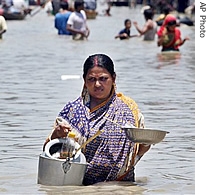2007年VOA标准英语-UN Warns of Health Crisis in Flood-Stricken Sou(在线收听)
Geneva
07 August 2007
 |
| A woman wades through a flooded street to collect food in Sirajgonj, about 104 kilometers (65 miles) north of Bangladesh's capital Dhaka, 03 Aug 2007 |
United Nations aid agencies say they are rushing supplies of clean water, food and medicines to the stricken area, but they are limited in what they can do. They say floodwaters in India, Nepal and Bangladesh have cut off many areas from road traffic. They say many places only are accessible by air and by boat.
The agencies say stagnant flood waters are breeding grounds for diarrheal and water borne disease, including cholera as well as insect-borne diseases such as malaria and dengue fever.
Spokeswoman for the World Health Organization, Fadela Chaib says about 1,400 cases of diarrhea have been reported in Bangladesh and hundreds of others in Nepal.
"Also, we are concerned about acute respiratory infections, as I said diarrheal diseases, vector-borne diseases and snake bites are also another concern," she said. "In Nepal, for example, WHO has pre-positioned diarrheal and emergency health kits in the most vulnerable areas and is now procuring supplies to equip the more than 10 medical teams in Nepal."
Flooding is an annual event throughout South Asia. But, this year's monsoons are regarded as some of the worst to have hit the region in many years. Some 30 million people have been affected by flash flooding in India, Bangladesh and Nepal.
World Food Program spokesman, Simon Pluess, says the effects of the flooding will linger on for a very long time.
"Families have lost crops and livestock. Houses and roads have been destroyed and livelihoods and schooling have been disrupted. Large water masses and soaring temperatures can lead to outbreak of diseases which, of course, puts the health and nutrition of children and vulnerable people at risk," he explained.
Pluess says only Nepal has asked for food assistance, which WFP is prepared to provide.
The U.N. Children's Fund says children, who make up 40 percent of South Asia's population, are particularly susceptible to water-borne and food-borne diseases. The agency says it is carrying out measles vaccination campaigns in Nepal and Bangladesh. And, it is airlifting tankers of purified water to the region.
Other U.N. agencies report they, along with private aid groups and governments also are working to deliver water, re-hydration salts and emergency medical supplies.
In the meantime, the World Meteorological Organization says unsettled weather will continue for the next two day and it is likely that South Asia will be in for a lengthy monsoon season.